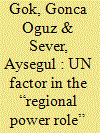| Srl | Item |
| 1 |
ID:
121471


|
|
|
|
|
| Publication |
2013.
|
| Summary/Abstract |
The article addresses the issues involved in Turkey's watchful neutrality vis-á-vis the Kurdish mobilization and the temporary autonomy deal in Iraq during the 1970s. Regardless of Ankara's long-held concerns about the spillover effects of the cross-border ethnic issues and growing outside assistance to the Kurdish insurgency by the US, Iran and Israel against Baghdad, Turkey stood aloof to the internationalisation of the Kurdish developments in Iraq. The successive governments in Turkey generally saw the Kurdish-Baghdad confrontation throughout the 1960s and early 1970s in the context of the Cold war and therefore were able to overlook its possible implications on its own Kurds, especially in view of the assurances extended to itself by its allies involved. Having no acute perception of vulnerability due to international conjuncture, the relations with the allies and domestic politics, Turkey seemed not to have any particular instrumental, affective or humanitarian motives to actively get involved in the then significant Kurdish developments in Iraq.
|
|
|
|
|
|
|
|
|
|
|
|
|
|
|
|
| 2 |
ID:
151323


|
|
|
|
|
| Summary/Abstract |
This article aims to explore the relationship between regional powers and the United Nations (UN) with respect to regional issues by examining UN-Turkish ties concerning the Middle East during the 2000s. Bidding for a leading regional role in the Middle East, especially in the 2000s, the Justice and Development Party (AKP) government in Turkey has increasingly used international platforms, including the UN, to gain a significant regional position in the Middle East. Turkey’s relationship with the UN in this respect could provide a relevant example to explore multilateralism and multilateral instruments in Turkey’s perceived regional power role during the last decade. The term “regional power” will be used as a conceptual framework to explore Turkey’s behavioural pattern with respect to the UN in view of the regional-global linkage, as global activism is nearly a standard behaviour of any state with a leading regional power role/claim. In view of this, the period during which Turkey held a temporary seat on the UN Security Council between 2009 and 2010 will be given particular attention in order to identify any significant link or at least any tentative correlations between Turkey’s then-closer involvement in the UN and its regional power role/claim in the Middle East. Moreover, fluctuations recorded in Turkey’s relations with the UN with respect to the Middle East during the last decade will be taken into account to examine a variety of challenges involved in any regional state’s relations with the UN regarding regional issues. Conducting a periodical analysis of Turkey-UN relations with respect to the Middle East could provide some provisional answers regarding both limitations and opportunities related to the future state of relations between any regional power and the most universal organization of world politics.
|
|
|
|
|
|
|
|
|
|
|
|
|
|
|
|